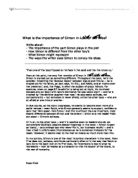What is the importance of Simon in Lord of the Flies?
Write about:
- The importance of the part Simon plays in the plot
- How Simon is different from the other boy’s
- What Simon might represent
- The ways the writer uses Simon to convey his ideas.
‘Then one of the boys flopped on his face in the sand and the line broke up.’
Even at this point, the very first mention of Simon in The Lord of the Flies, Simon is marked out as something different. Throughout the book, he is the outsider. Inhabiting the ‘dubious region’ between biguns and littluns – he is singled out for his faints, as Jack says, ‘In Gib.; and Addis; and at matins over the precentor,’ and, like Piggy, is often the subject of group ridicule. For example, when on page 92 he admits to being out at night, his mumbled excuses are put down with Jack’s dismissive ‘he was taken short’ – and he is crushed by ‘the derisive laughter that rose.’ He also seeks solitude, not companionship – but somehow is never afraid, unlike the other boys – who are all afraid at one time or another.
In due course, as the story progresses, he seems to become even more of a social recluse – even Ralph, who Simon generally seems to support, confides to Jack that ‘He’s queer. He’s funny.’ And this is without the one important, most drastic difference between Simon and the others – which only the reader finds out about – Simon’s epilepsy.

This is a preview of the whole essay
Peer Reviews
Here's what a star student thought of this essay
Quality of writing
The Quality of Written Communication is very high and this answer reads extremely well. There is evidence of a great adeptness in using the English language to successfully construct an effective analysis (range of sentences/sentence starters; punctuation; excellent grammatical adherence) meaning this answer is both well-informed and well-presented.
Level of analysis
The Level of Analysis is outstanding. This candidate nails Simon's character with such precision that it finally feels like we can properly understand him as a person as well as a thematic element in a novel. There is an excellently-expressed understanding of the entire novel, and the candidate does well to satisfy the examiner's desire to see candidates who thoroughly understand the entirety of the novel's they analyse inside and out. In between spots of analysis, there is a well-informed contextual appreciation of both the book, the author, and the themes explored in the book. Simply recognising the book is an allegory novel provides contextual marks as the candidate is showing they realise the book is deliberately symbolic, and thus delves deeper than most other candidates into exploring the function and purpose of Simon. Most impressive about this essay, is the understanding of religious references Golding makes about Simon's character. The recognition that when Simon reaches for unattainable fruit is symbolic of 'The Feeding of the Five Thousand' and how his encounter with The Lord of the Flies is representative of Jesus' temptation in the desert after 40 days of fasting (not to mention that the candidate realises "Lord of the Flies" is a literal translation from the Latin "Beelzebub"; this wins context and understanding marks), are all signs of someone who's analytical prowess is of a far higher ability than GCSE, meaning the only possible conclusion is to award top marks. I, and some other examiners, might argue that it is indeed Jack that is the living representation of all that is evil. He might not be described in such an eloquent form as Roger, but he nonetheless the representation of humanity once all of society's virtues and rights have been stripped away - Roger on the other hand at least showed signs of "aiming to miss the little'uns" when he first started throwing rocks at them, showing there is a very small, insignificant even, binding by society's expectation. However, the candidate is right on the grounds that Roger, like Jack, drops this social awareness later in the novel and submits himself to his innate animalistic desires and bloodthirsty survival instincts.
Response to question
This candidate's response is an immensely strong analysis of the character of Simon in 'William Golding's allegorical novel 'Lord of the Flies'. After almost every point, the candidate provides an appropriate piece of evidence from the source text with an explanation that suggests there is a profound understanding of the allegory Golding creates with this novel and particularly with Simon's character. A consistent focus upon the importance of the character of Simon is shown through an analysis of character, his beliefs, his interactions with other characters and also his symbolic contribution to Golding's allegory.







